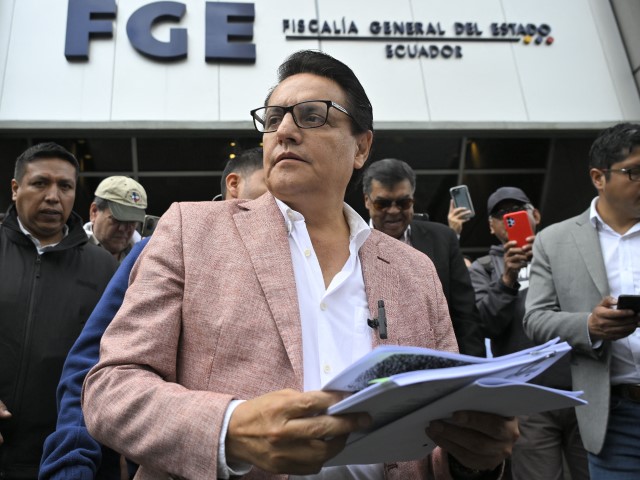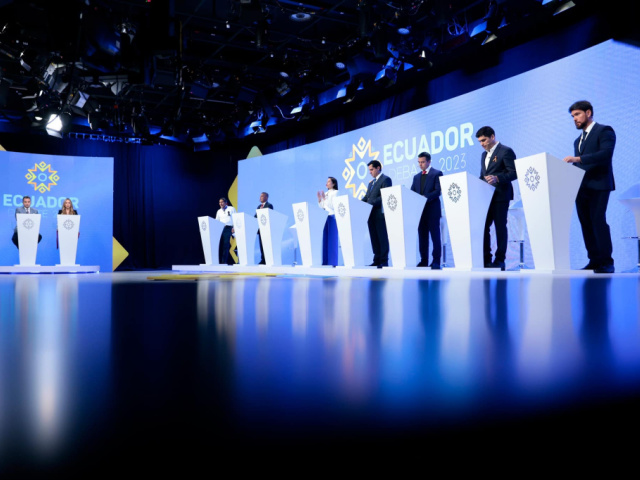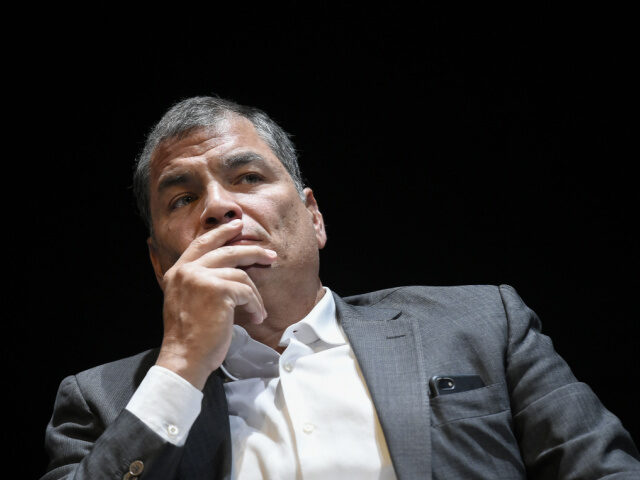Former Ecuadorian autocrat President Rafael Correa, a fugitive avoiding his corruption convictions in Belgium, claimed on Wednesday that the assassination of presidential candidate Fernando Villavicencio was a “right-wing plot” to “affect” the electoral performance of his party’s candidate, Luisa González.
Villavicencio became a household name in the country as a journalist, known for exposing multiple corruption schemes under Correa, who ruled Ecuador from 2007 to 2017. Villavicencio’s research as a journalist and, later, member of Ecuador’s National Assembly was critical in Correa’s conviction.
Villavicencio was one of the eight candidates in Ecuador’s August 20 presidential election, running an anti-socialist, anti-China, anti-corruption campaign. He was assassinated in a hail of gunfire on August 9 that injured 20 others in Quito as he was leaving a campaign rally.

Former Assembly member and now presidential candidate, Fernando Villavicencio, speaks to journalists upon his arrival at the Attorney General’s Office in Quito on August 8, 2023 (RODRIGO BUENDIA/AFP via Getty).
“It is evident that it is a plot, that the police is involved, and who benefits from this plot? The Ecuadorian political right-wing because they needed a political sacrifice like this, to blame us to prevent us from winning in a single round,” Correa told the Spanish news agency EFE on Wednesday.
“Only a political hecatomb could prevent our triumph in a single round and that hecatomb was the brutal murder of a staunch adversary of ours, Fernando Villavicencio,” Correa continued. “He was in fourth or fifth place [in the polls], so he was more good to them dead than alive.”
In reality, the results of a poll published by Ecuadorian polling agency Cedatos on Wednesday show Luisa González of Correa’s leftist Citizen Revolution party leading the race with 24 percent and Villavicencio in second place with 12.5 percent of the votes. The poll was conducted from August 7-9, prior to Villavicencio’s assassination.
Correa told EFE that Villavicencio’s murder “changed the whole reality and kicked the electoral board” of the upcoming presidential election.
“They create a whole narrative that we had threatened Villacencio and we are to blame for the murder,” Correa said. “And that, of course, has hit our [González’s] candidacy very hard and has moved the electoral chessboard, but it is something unheard of.”
Ecuadorian authorities have so far arrested six Colombian men in relation to Villavicencio’s murder. Correa, an ally of communist regimes in the region and notorious anti-American, accused the commander general of Ecuador’s National Police, Fausto Salinas, and former Interior Minister Patricio Carrillo of playing a role in Villavicencio’s murder, going as far as to “link” them to the CIA without providing any evidence to sustain any of his claims.
“It was always said that Villavicencio was a CIA informant and when these informants raise their profile too much, when his ambitions are overflowing and he wants to be president, he is also a hindrance for the CIA,” Correa claimed.
In reality, no evidence publicly available at press time links the killing to the CIA or any American government interests. Villavicencio had received numerous death threats from alleged drug cartel members after vowing to build a maximum security prison to eradicate organized crime and daring drug traffickers to kill him.
Correa himself had been among the powerful, threatening Villavicencio from his perch in Belgium. In November, Correa called Villavicencio a “shameless coward” on social media and warned, “Your party will be over soon.”
During Correa’s presidency, Villavicencio, a fierce opponent of Correa, was subjected to a fierce persecution campaign spearheaded by the then-ruling socialist government, which often accused him of being an “agent” of the U.S. Central Intelligence Agency (CIA). The persecution campaign forced Villavicencio to flee to save his life.
In 2014, Correa sentenced Villavicencio to 18 months in prison for insulting him, a violation of his constitutional rights. Villavicencio was able to avoid serving jail time by seeking refuge with the Sarayaku tribe, an indigenous community located in the south-central Ecuadorian Amazon.
The eight-candidate presidential race remains hotly contested and most certainly will require a runoff election between the two most-voted candidates as, according to Cedata’s poll, none of the candidates have the 50 percent of votes required to win in the first round. To win with one round of voting, an Ecuadorian presidential candidate must cross the threshold of 50 percent support.

The seven remaining presidential candidates in Ecuador’s upcoming election held a debate on Sunday under the shadow of the assassination of the eighth, Fernando Villavicencio, who was gunned down less than a week ago outside a campaign event (Facebook/Consejo Nacional Electoral del Ecuador).
Prior to his death, Villavicencio was running a campaign based on the eradication of corruption and limiting China’s influence and control of his country; China gained significant influence over Ecuador’s lucrative oil industry during the Correa administration.
Villavicencio’s journalism was instrumental in exposing a vast corruption and bribery graft network involving Correa and some of his government officials commonly referred to as Arroz Verde (“Green Rice”). The scandal was a crucial element that led to Correa’s conviction and eight years in absentia prison sentence for corruption in 2020. Correa fled the country in 2018 and has lived in Belgium since.
The center-right Construye movement, which had nominated Villavicencio as its candidate, announced this week that Christian Zurita, a journalist who worked alongside Villavicencio on the Arroz Verde investigation, will be the party’s new presidential candidate.
Correa’s Citizen Revolution party attempted to stop Zurita’s emergency candidacy and challenged Zurita’s candidacy, claiming that the journalist was not affiliated with Construye.
The head of Ecuador’s National Electoral Center, Diana Atamaint, announced on Wednesday evening that the top electoral authority had authorized Zurita’s candidacy after Citizen Revolution’s challenge of Zurita’s candidacy had been dismissed.
Christian K. Caruzo is a Venezuelan writer and documents life under socialism. You can follow him on Twitter here.

COMMENTS
Please let us know if you're having issues with commenting.